
Creedence Clearwater Revival, commonly abbreviated as CCR, was an American rock band formed in El Cerrito, California. The band consisted of lead vocalist, lead guitarist, and primary songwriter John Fogerty, his brother, rhythm guitarist Tom Fogerty, bassist Stu Cook, and drummer Doug Clifford. These members had played together since 1959, first as the Blue Velvets and later as the Golliwogs, before settling on Creedence Clearwater Revival in 1967. The band's most prolific and successful period between 1969 and 1971 produced fourteen consecutive top 10 singles and five consecutive top 10 albums in the United States – two of which, Green River (1969) and Cosmo's Factory (1970), reached number one. The band performed at the 1969 Woodstock festival in Upstate New York, and was the first major act signed to appear there.

Cosmo's Factory is the fifth studio album by American rock band Creedence Clearwater Revival, released by Fantasy Records on July 8, 1970. Six of the album's eleven tracks were released as singles in 1970, and all of them charted in the top 5 of the Billboard Hot 100. The album spent nine consecutive weeks in the number one position on the Billboard 200 chart and was certified 4x platinum by the Recording Industry Association of America (RIAA) in 1990. Rolling Stone ranked it number 413 on its 2020 list of the "500 Greatest Albums of All Time".
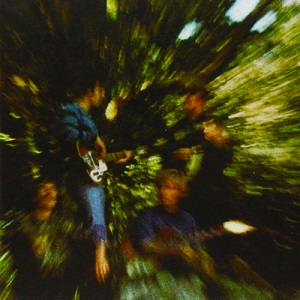
Bayou Country is the second studio album by American rock band Creedence Clearwater Revival, released by Fantasy Records on January 15, 1969, and was the first of three albums CCR released in that year. Bayou Country reached number 7 on Billboard's album chart and produced the band's first No. 2 hit single, "Proud Mary".
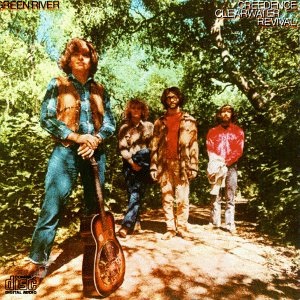
Green River is the third studio album by American rock band Creedence Clearwater Revival, released on August 7, 1969 by Fantasy Records. It was the second of three albums they released in that year, preceded by Bayou Country in January and followed by Willy and the Poor Boys in November.
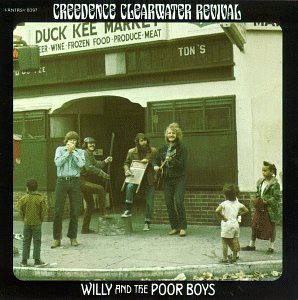
Willy and the Poor Boys is the fourth studio album by American rock band Creedence Clearwater Revival, released by Fantasy Records on October 29, 1969. It was the last of three studio albums the band released that year, arriving just three months after Green River. It was placed at number 193 in Rolling Stone's 2020 list of the "500 Greatest Albums of All Time".

Pendulum is the sixth studio album by American rock band Creedence Clearwater Revival, released by Fantasy Records on December 9, 1970. It was the second studio album the band released that year, arriving five months after Cosmo's Factory.

Live in Europe is the first live album by American rock band Creedence Clearwater Revival. Although released in 1973, it was recorded in 1971 during the Pendulum tour.
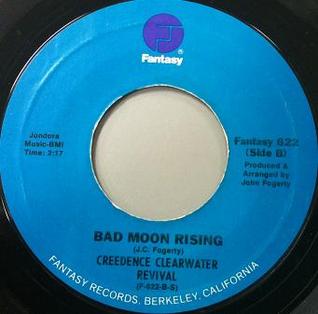
"Bad Moon Rising" is a song written by John Fogerty and performed by Creedence Clearwater Revival. It was the lead single from their album Green River and was released on 16 April 1969, four months before the album. The song peaked at No. 2 on the Billboard Hot 100 chart on 28 June 1969 and reached No. 1 on the UK Singles Chart for three weeks in September
"Born on the Bayou" (1969) is the first track on Creedence Clearwater Revival's second album, Bayou Country, released in 1969. It was released as the B-side of the single "Proud Mary" that reached No. 2 on the Billboard charts. The song was covered by Little Richard.

"Proud Mary" is a song by American rock band Creedence Clearwater Revival written by John Fogerty. It was released as a single in January 1969 by Fantasy Records and on the band's second studio album, Bayou Country. The song became a major hit in the United States, peaking at No. 2 on the Billboard Hot 100 in March 1969, the first of five singles to peak at No. 2 for the group.

The Concert is the second live album by American rock band Creedence Clearwater Revival, released by Fantasy Records in October 1980. It was recorded at the Oakland–Alameda County Coliseum Arena in Oakland, California, on January 31, 1970.
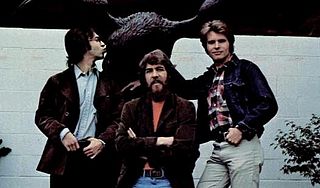
The discography of American rock band Creedence Clearwater Revival, who released their first album and singles in July 1968, includes 7 studio albums, 5 live albums, 41 compilation albums, and 29 singles. The group, although only active for 4 years, has sold more than 45 million albums and singles in the United States alone, and has charted in multiple countries throughout the world.
"Who'll Stop the Rain" is a song written by John Fogerty and originally recorded by Creedence Clearwater Revival for their 1970 album Cosmo's Factory. Backed with "Travelin' Band", it was one of three double-sided singles from that album to reach the top five on the Billboard Pop Singles chart and the first of two to reach the No. 2 spot on the American charts, alongside "Lookin' Out My Back Door"/"Long As I Can See the Light". In 2004, Rolling Stone ranked it No. 188 on its "500 Greatest Songs of All Time" list.

"Green River" is a song by American rock band Creedence Clearwater Revival. It was written by John Fogerty and released as a single in July 1969, one month before the album of the same name was released. "Green River" peaked at number two for one week, behind "Sugar, Sugar" by The Archies, and was ranked by Billboard as the No. 31 song of 1969.

"Long As I Can See the Light" is a song by American rock band Creedence Clearwater Revival, from the album Cosmo's Factory. Released as the flip side of the single "Lookin' Out My Back Door" in 1970, it reached number 57 on the Cash Box singles chart in the US, number 20 in the UK and number one in Norway.

"Sweet Hitch-Hiker" is a song by the American roots/swamp rock band Creedence Clearwater Revival from their 1972 album Mardi Gras. It was first released as a single in 1971 and reached #6 on the Billboard Hot 100, becoming their 9th and last top 10 hit. On the Record Retailer UK Singles Chart, it peaked at #36.
"Ramble Tamble" is a song written by John Fogerty and recorded by Creedence Clearwater Revival. It was released on the band's fifth studio album, Cosmo's Factory, in 1970. It is known for its lengthy instrumental section and tempo changes.

"It Came Out of the Sky" is a song written by John Fogerty that was included on Creedence Clearwater Revival's 1969 album Willy and the Poor Boys. It was also released as a single in some countries and has appeared on several of the group's compilation albums. It was included occasionally in the group's live set even after John Fogerty left the group and the remaining members reformed as Creedence Clearwater Revisited.
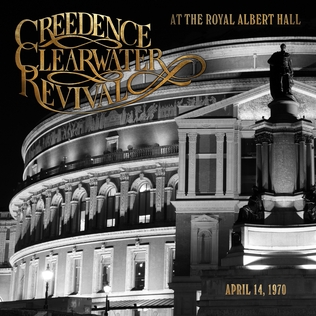
At the Royal Albert Hall is a 2022 live album recorded in 1970 with American swamp rock band Creedence Clearwater Revival. The performance was released as an album to coincide with the documentary film Travelin’ Band: Creedence Clearwater Revival at the Royal Albert Hall, directed by Bob Smeaton. The recordings document the band's first European tour and feature footage that has never been released; the album includes the entire set recorded on April 14, 1970.
Travelin' Band: Creedence Clearwater Revival at the Royal Albert Hall is a 2022 documentary film directed by Bob Smeaton. The film documents the origins of the American swamp rock band Creedence Clearwater Revival and their 1970 European tour, culminating in an April 14, 1970, performance at London's Royal Albert Hall. The movie takes its name from the band's song "Travelin' Band".
















